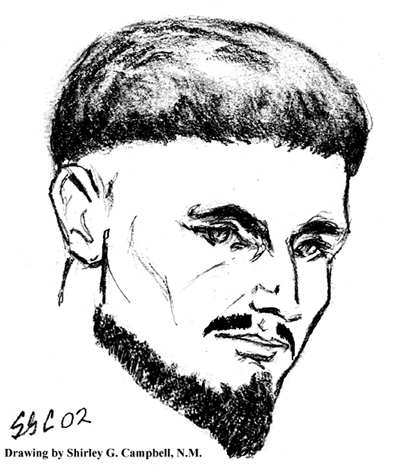
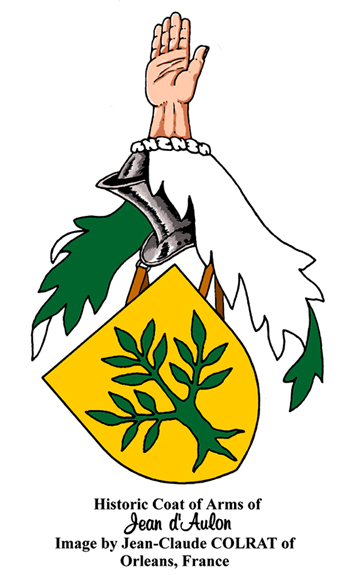


Jean d'Aulon, Part XIX
CHAPTER 27
LA TREMOILLE'S NOOSE TIGHTENS
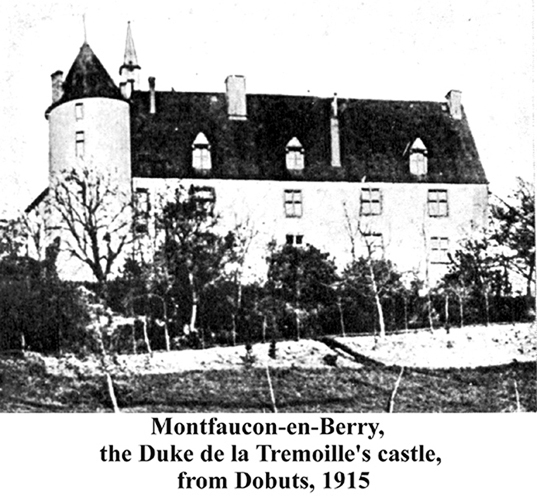
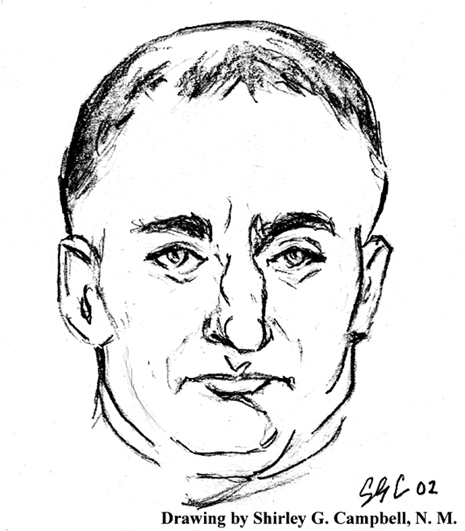

Jeanne went to Lord George to ask for a more tangible show of support than he had so far displayed. This two-faced viper promised to give his financial backing for the remainder of the campaign. Trusting as always, Jeanne returned to our forces that were now near the town of La Charité.
In our possession we had two bombards and two small cannons. Unfortunately we had enough power and saltpeter to fire them only for short periods of time. Our food supplies were also very low and would run out before the campaign was over.
On the fourth day of our siege, the north winds began to blow and with the winds came the clouds. It seemed to me that moment by moment they grew thicker until one solid mass of clouds blotted out all but the strongest sunlight. It began to snow early in the morning of the fifth day. At first, only light intermittent flurries fell but as the day wore on, it changed into a constant snowfall. By evening the storm had grown into a full-blown blizzard! The constant winds whipped the snow into ice curtains that limited our vision to only a few feet! The freezing wind drove the ice particles with such force that it cut and clawed at our exposed flesh causing our hands and faces to become numb and raw.
We took refuge within our tents and built small fires, but it was to no avail because the fierce winds blew right through the cracks and openings. We huddled before the fire in a futile attempt to warm ourselves, but we found little comfort there. Even by the open flames the frigid temperatures chilled us to the bone! My teeth chattered so violently that it was hard for me to even speak. "Jeanne, when did His Lordship say he would send us the food, gun power and men that we need?"
Jeanne, just as uncomfortable as I, pulled her cloak tight around her. Her voice crackled with anger, "He was supposed to have sent them within the past two or three days."
I rubbed my hands vigorously together in a vain attempt to warm them. "It seems to me that he has forgotten us! Jeanne, what should be done?"
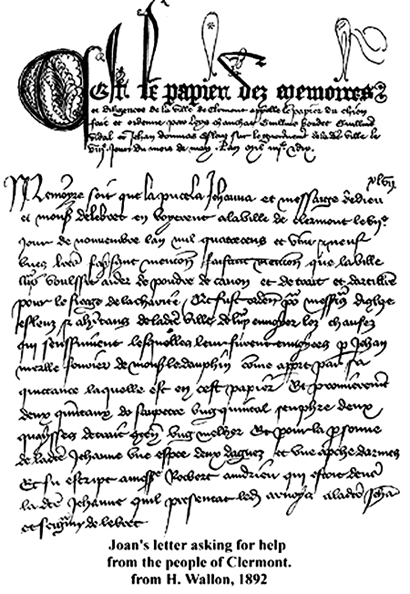
She squatted by the fire. "I agree with you. Please write letters for me asking help from the towns of Orleans, Moulins, Clermont and Bourges. Tell them of our desperate plight and how the town of La Charité is garrisoned by a superior force." She cupped her hands before her mouth and breathed heavily on them. When that failed, she practically put her hands into the fire trying to warm them. She shook her head in disbelief at our pathetic situation. "Tell them our gun power is all but depleted and that in three days or so, our food supply will be totally gone. Even if I did not pay the troops any more wages, I still don't have enough money to buy the food and other supplies we need. Tell them that if they don't help us, we will be lost!"
While we took refuge within our tents and waited for the storm to break, I composed all the letters Jeanne wanted. After two more severely cold days the storm finally ended. We emerged from our quarters to an eerie quiet. The wind had stopped and the bright sun reflected off the newly fallen snow
I sent the letters off with all possible speed. Then I accompanied Jeanne on her tour of inspection. Unfortunately for the enlisted soldiers, they had no tents in which to find refuge and they had to make do as best they could. It was appalling to see the state of their physical condition with the tip of many a man's nose-mottled white and red from frostbite. Those were the lucky ones. Others had swollen fingers and toes all dark red in color! We had to dismiss one fourth of our troops because they were unfit for service. Jeanne generously gave every dismissed soldier a few silver coins to help him on his way
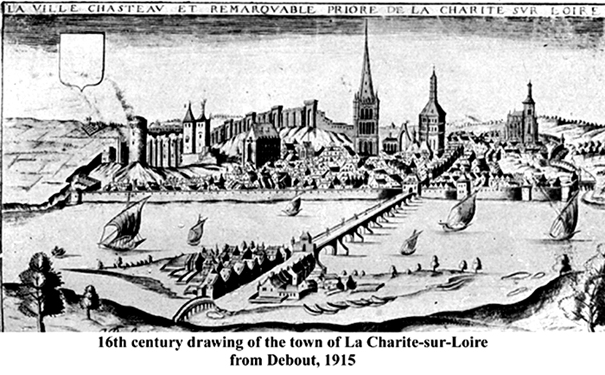
Right from the beginning this siege of La Charité seemed cursed. Disaster after disaster befell us. This particular one occurred when we tried to fire one of our cannons without warming the metal first. Instead of firing, it exploded sending shrapnel in all directions, which ripped those nearby into bloody little pieces, while severely wounding many more. Instantly, after the explosion, came the blood curdling shrieks of those still alive. This fiasco cost us the loss of many additional men. It was disheartening!
A few days after sending our letters, we began receiving assistance. From Orleans, we obtained many more cannons and bombards and fully paid soldiers to man them. The town of Bourges sent us enough money to pay our troops for an additional two weeks. From Clermont, we obtained enough gunpowder to fire our cannons for an hour a day. From Moulins, we obtained food to last a week, fifty additional men paid for a fortnight's service, plus one hundred and fifty francs. The towns of Riom and Auvergne also promised to send food and men, but they never arrived. Although the hard cold of the winter continued to show no mercy, with strict rationing, we were able to maintain the siege for another two and half weeks. Jeanne once again appealed to La Tremoille and even to the King for help, but none came!
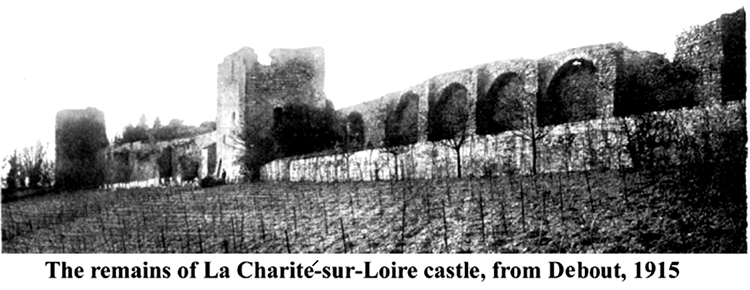
By the morning of Thursday, December 8th, the terrible weather had not eased up at all, and the bitter cold continued to take its toll on the men, horses and equipment. I became fed up with the whole situation and freely spoke my mind. "Friends, we have been suffering here for close to a month, now! I say we should quit this place! Remember that it was Lord La Tremoille's idea to start this campaign. Look how he backs up his own project. I don't mind dying for God and King, but this is outrageous! Our men are dying of cold and hunger, and for what? Nothing! My lords, let us leave this place."
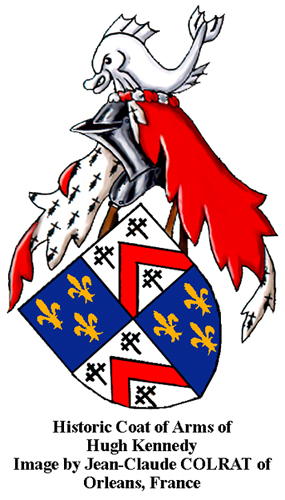
As Lord Albert and Saint-Severe considered the question, I motioned to Jeanne, Captain Hugh and Sir Jean that I wanted to speak to them privately. "Jeanne, the only reason I can see for Lord George to send you out here is for you to fail, and in failing, to lose favor in the King's eyes! La Tremoille does not care one bit about winning this place for the King. If he did, he would have supported us."
"Your Squire speaks the truth, lass," Hugh said grimly.
Sir Jean acknowledged the accuracy of my conclusion. "Yes, Jeanne, I sadly agree with your Squire. This enterprise was doomed from the beginning because of Lord Tremoille's treachery. We did all that we could. It is time we retire from the field to lick our wounds."
Jeanne understood. "I am unhappy to give up the siege and lose our bombards and cannons, but I see the truth of your words. Why should I expose my men to hunger and cold if the ones who asked me to start this campaign don't even support us with the barest of necessities?"
All agreed with her assessment and the order to break off the siege went quickly through the camp. Jeanne was despondent when she gave the order. "Trumpeters, sound the notes for the retreat. We will leave this place." And she turned her back on the town.
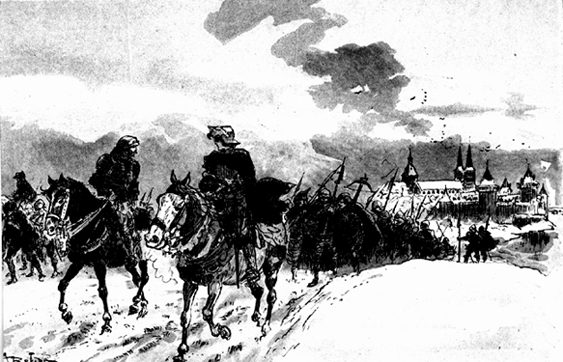
In disgrace and defeat, Jeanne, the captains and all our troops left La Charité. We rode away in silence, greatly saddened by the turn of events. The town's garrison laughed and jeered at us while they celebrated their victory over the 'witch.'
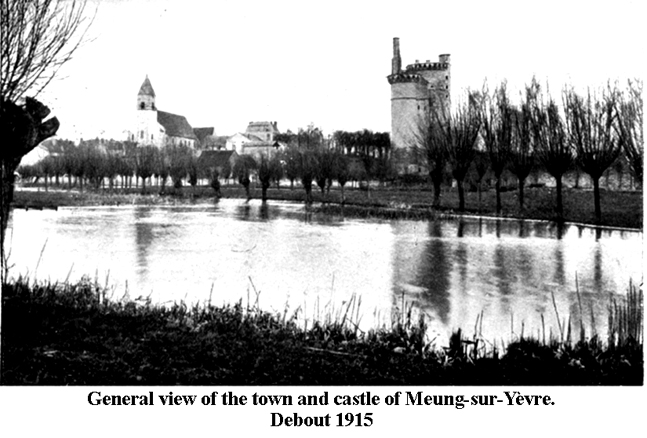
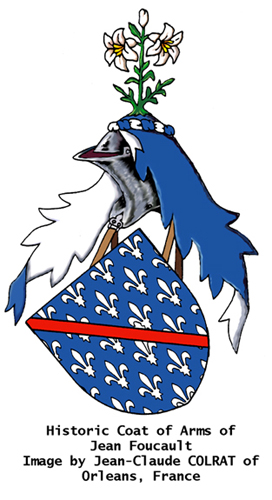
By the afternoon of December 9th we reached the town of Meung-sur-Yèver, where the King and his court had been staying. We said a sad farewell to our loyal friends, Sir Jean and Captain Hugh and their men.
"Where will you go?" Jeanne asked.
"I am not sure where I will end up, m' lassie," Hugh replied grimly, "but I will head back to Orleans in hopes that there will be room for I and me men." He took hold of Jeanne's hand and looking directly into her sad blue eyes quickly added, "If in the future you have need of a crusty old Scot, just call."
Smiling through her sadness, Jeanne put her hands on Hugh's shoulders. "I promise I will, good soldier."
Sir Jean stepped forward and gently placed his hand upon her trembling hands. "I will head for Jargeau and Captain Hugh's offer is mine as well. I hope that our fortunes will improve and that our paths will cross once again. God bless you, dear Maid."
Jeanne barely able to speak stammered out, "May our Good Lord make it so."
The next morning Jeanne and what remained of her personal staff attended Mass in the company of the Archbishop, Lord George and the King. Jeanne was sullen, for this new betrayal had only reopened the old wound of Paris. How she was able to be in the same room with these men was beyond me!
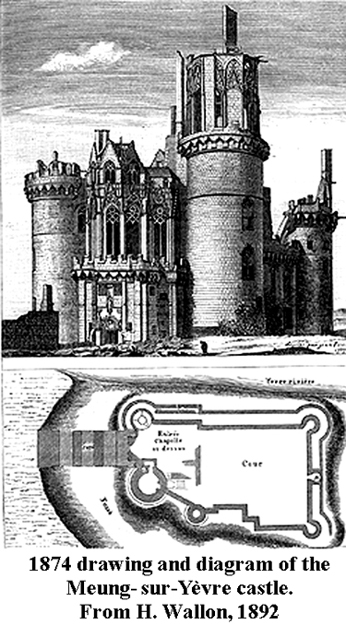
That evening the King gave a sumptuous feast in the great hall of the castle. His royal colors were hung everywhere. The cloth covered the columns, cascaded from the musicians' balcony and delicately draped the windows. Many a pleasing and delightful scent filled the air. The dulcet sounds of very fine musicians filled the banquet hall. We feasted on delicious soups and fish, as well as exquisite stuffed geese and pheasants, all beautifully prepared and presented. I noticed how sparingly Jeanne ate that evening. She was in no mood to celebrate because her heart was crushed.
At the conclusion of this lavish feast, the King motioned to his aide who then ordered the gathering into silence. The King then rose from his chair as he carefully opened the large scroll and read:
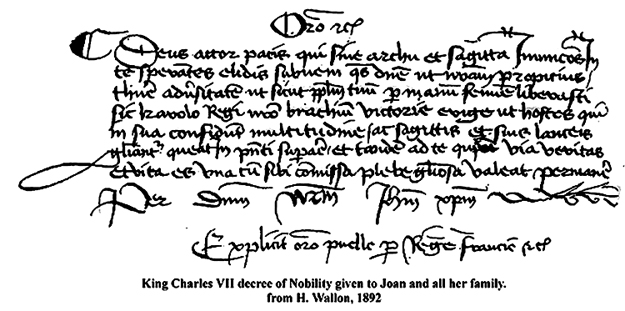
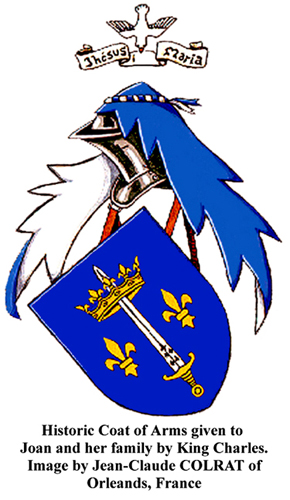
"We, Charles, the seventh, being by God's grace and help, King of France, do grant the status of nobility, not only upon Jeanne, the Maid, but to her father, her mother, her three brothers, and all children born, or yet to be born of them and of her. Hereafter they shall all have the right to and the privilege of, displaying as their coat of arms, an azure shield, a silver sword supporting at its point a gold crown, between two fleurs-de-lis. With this shield is also granted the family title of du Lys. This is done as an expression of praise to God, for the many favors that He has accorded to us through our dear and well-beloved Maid, Jeanne D'Arc. This we say and declare for all time to be true and fact; we hereto affix our royal seal. Written at Meung-sur-Loire and given this 10th day of December in the year of Grace, 1429."
How cruel he was to give her praise and honors that she never once asked for, as signs of his undying appreciation. Yet the very thing that meant the most to her and would have shown her the most gratitude, this he would not give. Where was his help when she was before La Charité or when she was before Paris? How could he so easily lie?
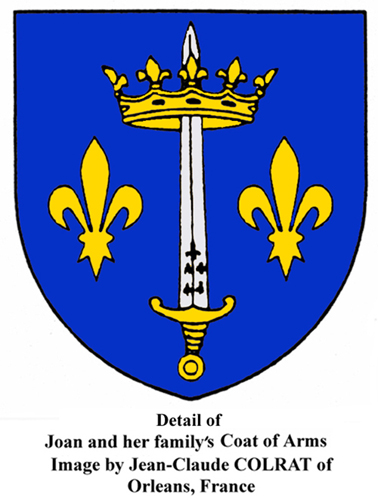
The King smiled lovingly at her while motioning her to come forward. Jeanne languidly got up from her place and with her eyes downcast she advanced to the throne. Upon reaching him she bowed deeply from her waist, before going to her knees. She continued to avert her eyes not wanting to look into his face. Her demeanor was very solemn as she spoke with emotion. Her voice was not filled with joy or gratitude, but with hurt and bitterness. "Thank you, Your Majesty, for your kindness to my family." Jeanne took the scroll from his hands, still without looking at him, and again bowed low. Turning briskly she left the room, unaware of the congratulations coming from those around her and the questioning eyes that followed her. I easily recognized her great distress, so I also left the gathering, followed close behind by Peter and John. We found Jeanne down the hall in a dimly lit alcove crying bitterly as she looked at the parchment. Suddenly with great force she flung the scroll to the floor. She stomped on it as she cried out in pain and frustration!
Horrified by the sight, her two brothers yelled at the same time, "Jeanne, stop!" They rushed over to her, not to comfort but to snatch the crumpled parchment from the floor. Peter began to smooth it as he chided his sister. "Jeanne, this is no way to treat a gift from the King!"
Jeanne managed to contain her sobs just long enough to respond, "If you want it, take it! As for me, it does not exist!" Like a wounded fawn, she ran off vanishing into the darkness, solitary in her heartache and grief. ALONE.
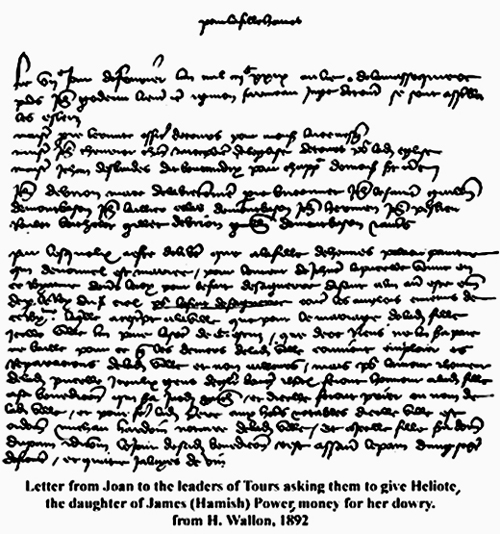
In the coming weeks, Jeanne was required to accompany the Court as it moved aimlessly from Meung-sur-Yèver to Bourges to Sully. News came from Tours that Heliote Power, the daughter of Hamish Power, the artisan who had created Jeanne's standard and pennant, was getting married. Because Heliote was Jeanne's age, they had formed a close friendship and so it was only natural that Jeanne would want to honor her friend with a gift. She remembered that the administrators of Tours had expressed a deep desire to reward her. She therefore asked them to give one hundred silver francs to Monsieur Power so that he could buy his daughter a trousseau. They refused, but did offer, "For love and honor of the Maid, we will honor Heliote at her wedding by giving her some bread and wine." It was disappointing to see their stinginess in regard to Jeanne's request, but it only indicated her declining status with the people.
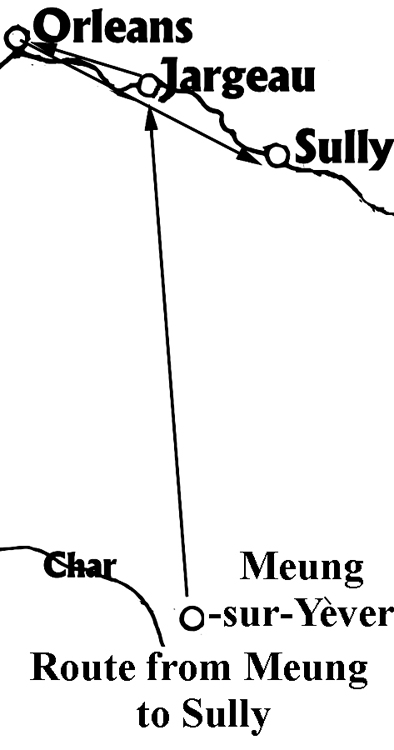
Jeanne celebrated, if you can call it that, Christmas Day Mass with the Court in the town of Jargeau. A few days later, the representatives from Orleans came and invited her to join in their remaining celebration of the Christmas season. To this Jeanne happily agreed.
During our time in Orleans, the Mayor graciously gave us accommodations in his home. On the 6th of January, the Feast of the Epiphany, and Jeanne's birthday, Orleans ended the Christmas festivities with a great banquet in her honor. Filling the large city hall to capacity were all the important citizens. With great ceremony and fanfare the chefs paraded their creations past all the guests. The City Fathers provided a large number of delicately prepared and seasoned dishes that included six fattened roosters, nine partridges, and thirteen rabbits, along with capons, partridges and a pheasant. Between each course there were numerous speakers who praised Jeanne and we consumed large quantities of wine after each toast. The banquet lasted well into the evening and ended with an exchange of gifts. The Mayor, to Jeanne's embarrassment, forced her to sit on the dais at the end of the room. The guests then formed a line that extended the full length of the banquet hall. One by one they came forward to lavish on her the finest gifts that the individual could afford. Overwhelmed by their generosity, she cried as she graciously thanked each one.
Among the guests were little Charlotte and her parents. When it came time for Charlotte to present her gift, the little girl leapt onto Jeanne's lap. Her face beamed as she thrust her small parcel into Jeanne's hands. "I made this just for you Maid, I mean Jeannette."
Jeanne hugged and kissed the child. "What could this fine present be? May I open it, now?"
"Of course, I want you to! I hope you will like it."
"There is no doubt of that! If you truly made this for me, then I will love it!" Jeanne opened the box to find a crude cross-stitch picture of an angel.
Charlotte's little chest puffed out with pride. "It's a picture of Saint Michael the Archangel, and I made it just for you!" she added pointing to herself.
Jeanne's face lit up with joy when she saw her little friend's handiwork. "It is lovely, Charlotte! I did not know you were so talented. " She smiled into the child's eyes.
Charlotte became embarrassed and shyly confessed, "I had some help from my momma, but mostly I did it by myself."
Jeanne whispered, "Of all the gifts that I have received tonight, yours is the most precious to me, because it came from your heart." Jeanne paused a moment as she felt for something in her purse. "I have a little gift for you, too. Would you like me to give it to you now?"
The child excitedly squirmed in Jeanne's lap. "Yes, oh yes, Jeannette, please may I see?" Jeanne then pulled out a small gold crucifix with matching chain. "May I put it on you?"
Charlotte nodded her head vigorously. She closed her eyes while Jeanne slipped the chain around her neck. She opened her eyes to gaze down at Jeanne's present. The child lavished the crucifix with many kisses before pressing it to her heart. Then, with tears in her eyes, she flung her arms tightly around Jeanne's neck and hugged her.
We remained in the warm embrace of the people of Orléans until Sunday, January 22. But even this small period of joy was greatly marred by the sorrowful news that Jeanne's beloved older sister, Catherine, had died a month earlier while giving birth. To compound this calamity Jeanne learned that Catherine's little new born son had also succumbed to the power of death. Jeanne's grief was inconsolable. She blamed herself for not being with her sister when Catherine needed her most. Her guilt consumed her because she knew that had she been at her sister's side and not idling her time away in the company of the rich and powerful, Catherine and her little child would still be alive. Jeanne's suffering heart found little or no comfort - not even in prayer. Jeanne languished in silence. She kept this crushing blow from all but those who knew and loved her best - her personal staff.
All this time, the King, Archbishop and Lord La Tremoille were finishing up yet another truce with the Duke of Burgundy. Originally this truce was to run until the 16th of March, but this time they extended it until the end of April. Despite this truce, or should I say because of it, Jeanne had to remain at Court. Unhappy as she was, she nonetheless spent her time thinking of others. In each town she continued to give generous alms to the poor and destitute and to visit the orphan children.
To ease his conscience, the king lavished costly gifts upon Jeanne. He gave her expensive horses with beautiful harnesses for them. He gave her money and exquisite clothes. Jeanne enjoyed these gifts. She enjoyed riding her horses and wearing the fine garments and giving her money to the poor, but she must have felt like a bird in a cage. As a brave eagle longs to soar free, Jeanne longed for the freedom of the open fields and home. Not a day went by that she did not try to find a break in the walls that surrounded her.

All that Jeanne warned against began to happen. By the middle of February, the English gave the Duke of Burgundy the counties of Brie and Champagne as an extension of his domain. In addition, the English landed a force of two thousand new troops at Calais. Their purpose was to strengthen the English hold on Normandy and to help defend Paris from any future attack.
Compiegne, a town north of Paris, and the city of Reims refused to surrender to either the Burgundians or the English. Alone and fearful they felt abandoned by the King. They had no one to turn to or to trust, except Jeanne. In mid-March, Jeanne received a letter from the citizens of Reims. It was similar to the one she had received the previous year. Again they expressed their fears of betrayal and takeover. Jeanne tried to reassure them that she would not let the King abandon them, nor would she let the enemy attack them while she lived.
"To my dear and good friends, men of the Church, burgesses, and other inhabitants of the city of Reims. Very dear and cherished friends, whom I so much desire to see: I, Jeanne, the Maid, have received your message in which you mention your fear of siege. It will not occur if I can meet the enemy soon. But if it should happen that I cannot fight the enemy, you will be safe if you close your gates to them because I shall soon be with you. If the enemy is there when I come, I will make them put their spurs on in such haste that they will not know where to find them! The enemy's time at your gates will be short, for my coming will be soon. For the present, I write no more except that you remain always good and loyal. I pray to God to hold you in His keeping."
"Written at Sully, the 16th day of March.
I would send you some further news that would make you very happy, but I fear this letter might be captured on the road, and my news would be seen. JEANNE"
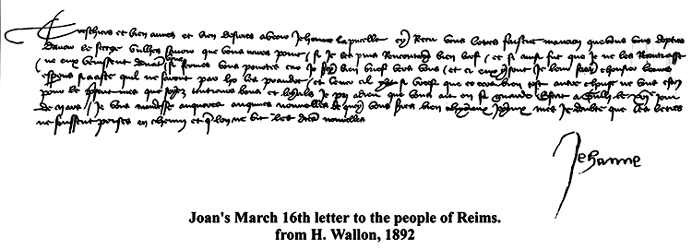
The sufferings of these people rent Jeanne's heart. She went to the King begging, with all her passion, to give her some soldiers. She wanted to counter the enemy's threat to the northern towns. Unfortunately the truce with the Burgundians was still in force until April 23rd and neither the King nor La Tremoille had any desire to upset the proverbial apple cart. His Lordship continued to receive his bribes from the Burgundians and the King still hoped to make the Burgundian Duke his ally against the English.
A week later Jeanne received another urgent letter from the inhabitants of Reims, to which she replied:
To my dear and good friends, men of the Church, aldermen, burgesses and the other inhabitants and masters of the good city of Reims. Very dear and good friends: May it please you to know that I have received your letter, which shows how you reported to the King the evil that is within your good city. It has, in fact, been reported to him that there were many who wanted to betray your city and let the Burgundians in. Since you have told the King that you have no desire to return to the Burgundians, he is very pleased with you and you remain in his graces. If you have need and are besieged, he would help you. He knows fully of your sufferings and hardships that are caused you by those traitorous Burgundian adversaries. He will deliver you from them, by the grace of God, soon, that is to say, the very soonest that he can. For this reason I pray and request you, my very dear friends, faithfully guard the good city of the King and keep alert. You will soon hear my good news more fully. I write no more except that all of Brittany is French, and the Duke is required to send the King four thousand combatants, paid for four months. I commend you to God, Who keeps you in His care."
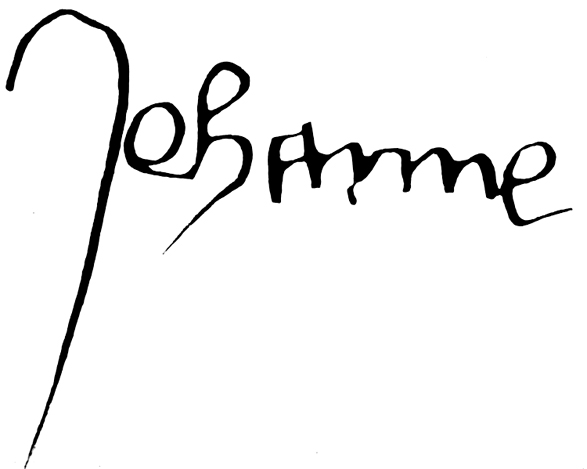
"Written at Sully the 28th of March. JEANNE"
This was the last letter that Jeanne ever dictated to me. Filled with anguish, Jeanne spoke of her frustrations. "Jean, I can't stay here any longer, a prisoner and inactive, while good Frenchmen are in danger." Absorbed in thought, she slowly walked over to the window. Heaving a heavy sigh she stared out onto the gently rolling fields and forests that were lit by the setting sun. "Somehow, I will free myself so that I can defend my friends and repel the enemy's attacks."
She greeted her personal staff warmly as we entered her room. Not knowing the reason for this sudden call, we looked from one to the other in questioning silence as we sat down where we could. "I called you all here, my friends, to plan with you in secret our escape from the King's court! I cannot stay here any longer while I see my fellow countrymen in danger from the enemy. Together, we must devise a plan in which we can leave here and take all our needed equipment and arms with us. At the same time we must be careful not to arouse the suspicions of the King, Lord George, or the King's guards who constantly watch us from afar. What do you say?"
John, her brother, spoke first. "We need to know how many guards there are and the times of their watches. We need to know who comes and goes through the gate every day, and when they do so."
Peter sat thoughtfully looking out the window. "Where do you want to go and what do you want to do once we are outside the castle, Jeannette?"
She stood tall in our midst and declared, "I must fight the enemy, whether they be English or Burgundian!
"Then, Jeannette, you need to know where the closest band of freelancers is and go to that town."
I commented, "We will need to know where the roads lead. We need someone to reconnoiter this whole area."
As Jeanne paced the length of the room she formulated a rough plan. "Good, now here is what we shall do." She turned thus to Father Pasquerel. "Find out where the nearest band of freelancers is located. If you ask, it will not arouse as much suspicion."
"I will do my best, Daughter."
"John, I want you to find out all you can about the posting of the guards. Be careful, the slightest mistake and all is lost."
"Don't worry about me, Jeannette."
"Peter, you need to find some way of smuggling our armor and other equipment out of the castle."
She came at last to me. "Since it is your idea, Jean, I want you to reconnoiter the area. As for me, the best thing I can do is to act as if nothing was happening and that I am content to stay at Court. Be back here by tomorrow night. Then we can make more definite plans."
I asked as I left, "Why the rush, Maid?"
Jeanne was distracted and anxious. "The enemy will not wait. Why should we?"
I kept my silence.
